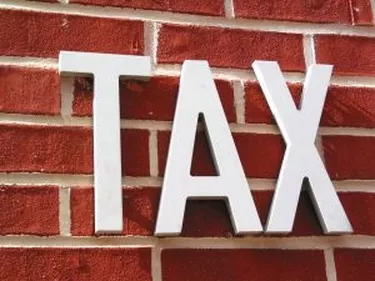
Tax Day is a day of reckoning for those who lack the funds to pay the Internal Revenue Service what they owe. How you handle this debt can alleviate your cares or compound the issue in a costly way.
Ignoring the fact you owe the IRS money can lead to a financial calamity that can't be addressed by those companies that say they can provide you relief from your tax debt. In fact, whether you miss a tax filing deadline or fail to pay your tax bill in full, the consequences can be severe. Your best bet is to file past-due tax returns as soon as possible, a move that will limit penalties and interest on the back taxes you owe.
Video of the Day
Video of the Day
Consider also: Tax Return Preparation: Tax Services, Tax Help & More
What Are Back Taxes?
Back taxes are those taxes that you did not pay when they became due. These taxes are an outstanding state or federal tax liability that became due in a prior year.
For federal taxes, this due date is typically April 15 unless you request an extension to file, which gives you an additional six months to file a return. The extension relates to filing your return, not to the payment of your tax bill. You must pay the tax you owe by the tax payment deadline.
File a Past-Due Return as Soon as You Can
If you owe back taxes, file the past-due return as soon as possible. If you can't afford to pay your back taxes in their entirety, you can request a payment plan or make an offer in compromise, which allows you to settle your tax debt for less than the full amount you owe.
How to File a Past-Due Return
If you want to pay back taxes that you did not pay when they became due, file a past due return. This process is different from filing an annual tax return that's typically due on April 15 in a few ways.
To begin, gather your financial documents, such as your W-2 and 1099s for the year the back taxes were due, and download the tax forms you require. The information you will need for your past-due tax return is identical to what you need to file a regular return. For instance, you'll need receipts that back up a claim for a tax deduction or credit.
Consider also: Filing an Extension for Taxes
Request Tax Return Transcript
If you lack the documentation you need to file the return, ask the IRS to send you a tax return transcript either electronically or by mail. The IRS makes available the transcripts for the current tax year as well as the prior three tax years. If you need a transcript for a tax year that occurred four or more years in the past, you'll need to submit the form 4506-T to request it.
Use Tax Forms for the Appropriate Year
When the tax law changes, tax forms are updated. So, you'll need the tax forms and instructions that relate to the year for which you are filing back taxes. You can access these forms via a prior-year forms database on the IRS site.
Once you have the forms, if you find that you need help preparing your past-due return(s), you may want to contact a tax professional or use tax preparation software. Once your past-due return is complete, you'll need to mail the return and your payment to the address provided on Form 1040. The address is also provided on IRS late notices. After you pay your back taxes and any penalties and interest, the interest will no longer accrue.